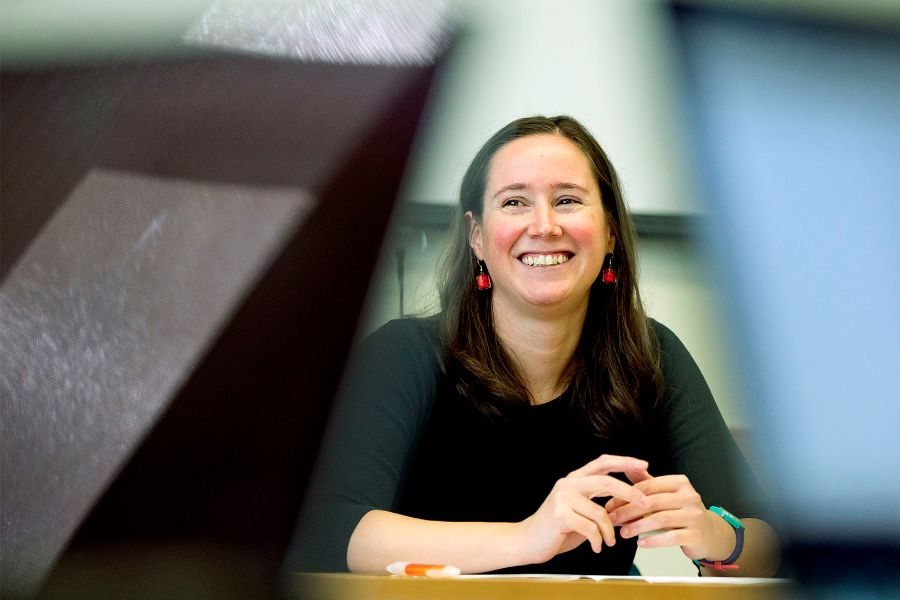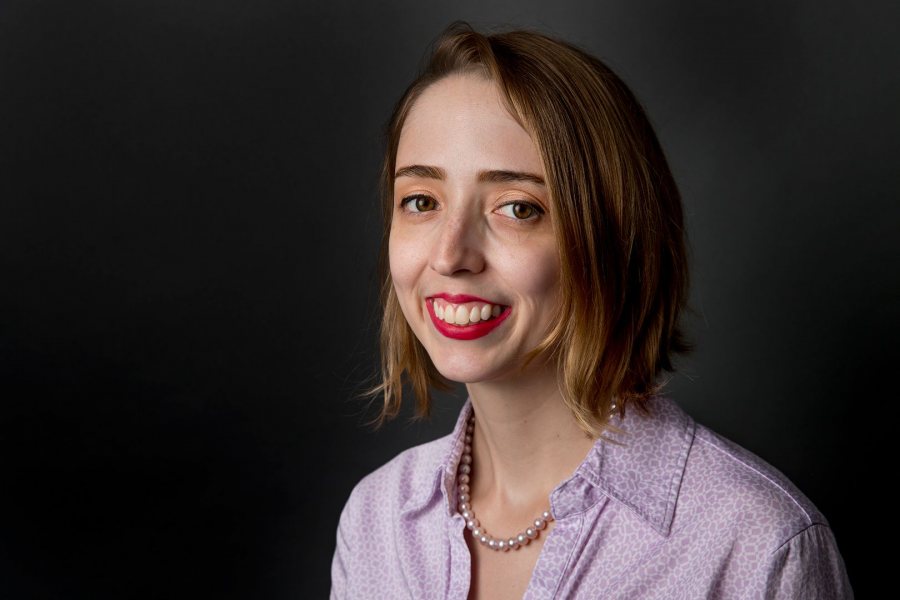Bates Football
How to tackle concussions? High schools get helmets with sensors — Portland Press Herald
Mike Lowe of the Portland Press Herald includes Bates in a story about Maine schools outfitting football players with high-tech helmets that use sensors to record the location and intensity of blows to the head so coaches can monitor for concussions and teach players to tackle more safely.
Most Bates players use the new SpeedFlex Insite helmets. “It’s helping us look at what we’re doing, how can we coach our players better,” said Nick Cooke, assistant athletic director of athletics for athletic performance.
Also in on the action is Howard Vandersea ’63, founder and president of the Maine chapter of the National Football Foundation, whose $2,000 grant helped Saco’s Thornton Academy buy new helmets.
Vandersea said it’s what the organization is looking for when it provides grants. “If it’s going to help young kids and make (football) safer,” he said, “that’s what we’re going to do.”
Read the story:
- “How to tackle concussions? High schools get helmets with sensors,” Portland Press Herald, Oct. 20, 2019
Elizabeth Strout ’77
Elizabeth Strout’s view from the top — WNYC
Accompanied by WNYC’s New York Radio Hour reporter KalaLea, Elizabeth Strout ’77 returned to campus over the summer and climbed Mount David for the first time since senior year.
Strout grew up in small-town Maine and New Hampshire, and she was fascinated by the view of Lewiston that Mount David offered. “I just loved to see that array of buildings that meant there were people down there,” she told Lea. “It was my first city.”
Her experiences at Bates and in Lewiston “enormously informed,” her work, she said. Reading Sherwood Anderson’s Winesburg, Ohio, in Jim Hepburn’s course taught her how to write with a sense of place, while plays read in Martin Andrucki’s theater courses showed her dialogue.
“I learned a lot about dialogue reading those plays — Clifford Odets, Tennessee Williams, just reading and reading plays,” she said.
“But the experiences I had in town also informed my work,” she added. “When I was working as a waitress, I was working with people from Lewiston. They weren’t from Bates. I waitressed at the first disco. That was amazing.”
Listen to the story:
- “Elizabeth Strout’s view from the top,” WNYC, Oct. 4, 2019
Benjamin Mays, Class of 1920
The late Rep. Elijah Cumming’s favorite poem linked to Benjamin Mays — multiple outlets
Following the Oct. 17 death of U.S. Rep. Elijah Cummings, a few news outlets recalled Cummings’ first speech on the floor of the House, in 1996, when he recited a favorite poem that has long been associated with Benjamin Mays, Bates Class of 1920.
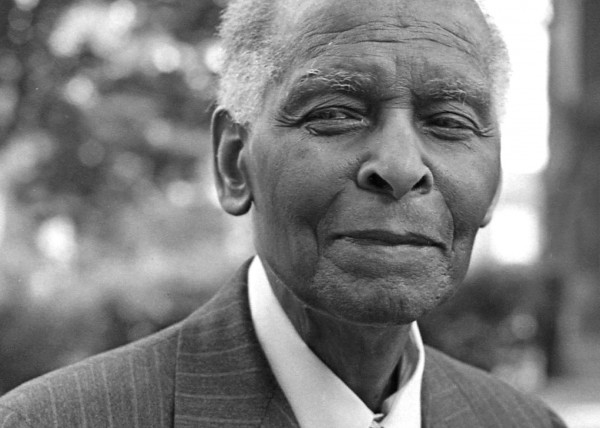
Benjamin Mays ’20, photographed in 1980 when he returned to Bates for his 60th Reunion. (Jim Daniels)
Known as “God’s Minute,” the anonymous poem has a carpe diem theme:
I only have a moment
Only 60 seconds in it
Forced upon me
Can’t refuse it
Didn’t seek it
Didn’t choose it
But it’s up to me to use it
I must suffer if I lose it
Give account if I abuse it
Read the stories:
- “Elijah Cummings Recited a 46-Word Poem In His Very First Speech to Congress. Read It Now and Be Inspired,” Inc., Oct. 18, 2019
- “Watch Elijah Cummings’ powerful 1st House floor speech praising ‘the things we have in common,” Oct. 17, 2019
Deshun Peoples ’17
Student lands place at top art college thanks to nine months training in China — Encounters in China
Deshun Peoples ’17 was featured on the YouTube channel China Icons in a film exploring the relationship between Peoples and Jiang Xingda, a ceramicist in Jingdezhen, the “capital of Chinese porcelain,” during the year that Peoples spent in China on a Fulbright U.S. Student award.
Peoples and Jiang met in 2016, when Peoples, himself an accomplished ceramicist on a study-abroad program in Jingdezhen. When Peoples returned to the city the next year for his Fulbright year, Jiang agreed to teach him what he knew about color and patterns in pottery, in exchange for English lessons.
“I learned a lot about culture,” Peoples said of his time with Jiang. “I learned a lot about friendship and about engagement with people. I can’t imagine my experience in Jingdezhen without him.”
Tessica Glancey Crampton ’12 and Robert Crampton ’13
Philadelphia weddings: Tessica Glancey and Robert Crampton — The Philadelphia Inquirer
Kellie Patrick Gates of The Philadelphia Inquirer told the Bates backstory of Tessica Glancey Crampton ’12 and Robert Crampton ’13, who got married on Aug. 30 in Philadelphia.
The two met in a seminar on American political development and went on their first date at the Blue Goose, a popular bar among students. “Walking home, I realized I was completely smitten already,” Tess said.
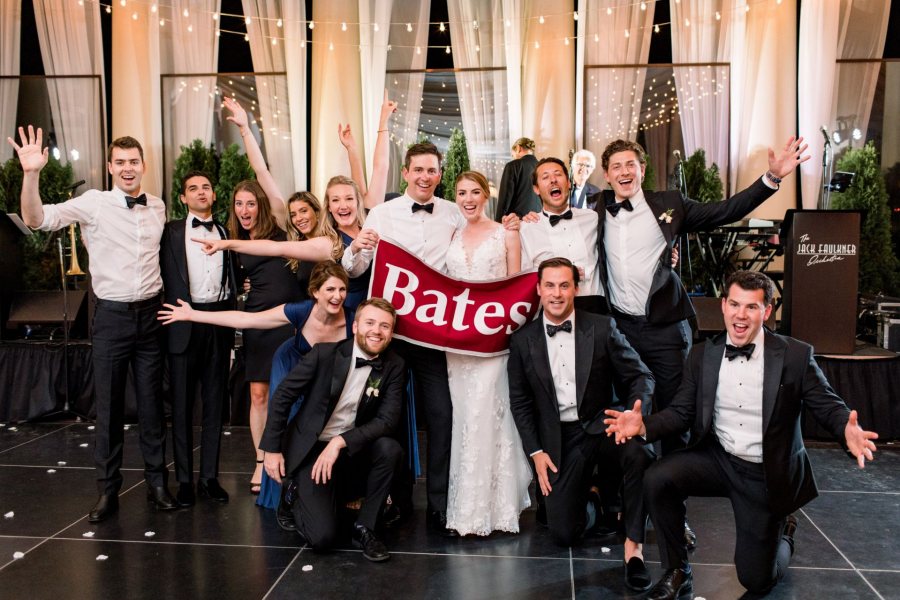
Tess Glancey ’12 and Rob Crampton ’13 pose with Bates friends at their wedding reception on Aug. 30, 2019 in Philadelphia.
During the wedding festivities, Tess, a media relations manager at Fox News, and Rob, who is earning an MBA from Dartmouth, took time to get a picture with the traditional Bates banner.
Read the story:
- “Philadelphia Weddings: Tessica Glancey and Robert Crampton,” The Philadelphia Inquirer, Oct. 10, 2019
Adriana Salerno
Episode 46: “Adriana Salerno” — My Favorite Theorem
Math podcast My Favorite Theorem featured Associate Professor of Mathematics Adriana Salerno, who is a big fan of Cantor’s diagonal argument, which states that “real numbers do not have the same cardinality as the natural numbers.”
The theorem has to do with counting the number of numbers. There are infinitely many integers, such as one, two, three, and so on. There are also infinitely many rational numbers, like one-half and three-eighths — and mathematicians say those types of numbers reach the same infinity (trust us on this one).
But according to Cantor’s argument, there are infinitely many real numbers, like pi and the square root of four, but the infinity that those numbers reach is a different infinity than the infinity of the infinitely many rational numbers and integers.
“This theorem shows without a doubt — although some students still doubt me — that there are different sizes of infinity,” Salerno said. “It’s a very lovely succession of ideas.”
Listen to the podcast:
- Episode 46: “Adriana Salerno,” My Favorite Theorem, Sept. 11, 2019
Michael Morgan ’22
Michael Morgan continues to build on his creative legacy — The Gleaner
Keisha Hill of Jamaican newspaper The Gleaner profiled Michael Morgan ’22. A double major in politics and rhetoric from Kingston, Morgan has made waves as an artist and climate change activist.
Interested in international relations with an eye toward communications and outreach, Morgan completed a summer 2019 internship at the United Nations Sustainable Development Solutions Network–Youth Initiative.
He returned to the UN on Sept. 21 to represent Jamaica at the United Nations Youth Climate Summit, attending meetings with world leaders and doing interviews with international media.
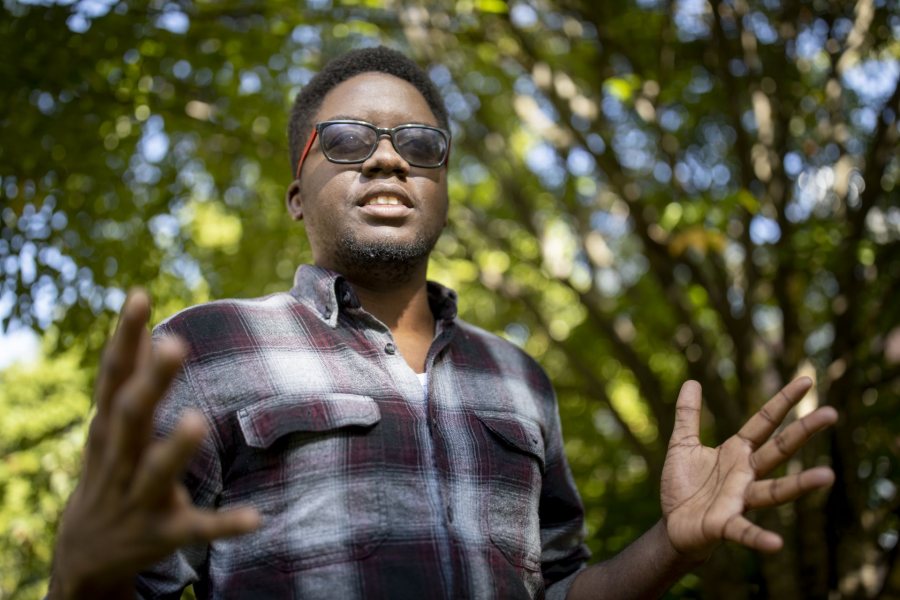
Michael Morgan poses on the Historic Quad before attending the United Nations Youth Climate Summit in September 2019. (Phyllis Graber Jensen/Bates College)
On the artistic side, Morgan is a graphic designer for student clubs and the lead painter on a mural at the Center for Global Education. At Bates, “I got the chance to expand my thinking on topics such as politics, the arts, and the environment,” Morgan said.
Compared with his earlier schooling, “there was less rigidity surrounding grades and competitiveness and more time given to building a rounded individual keen on exploring their passion for a greater purpose.”
Read the story:
- “Michael Morgan continues to build on his creative legacy,” The Gleaner, Sept. 20, 2019
Carine Warsawski ’07
Jewish summer camp with campfires, crafts, and no lights out — The New York Times
For The New York Times, Rachel Levin wrote about her weekend attending a summer camp for Jewish adults in California’s Simi Valley. Trybal Gatherings, founded by Carine Warsawski ’07, organizes the popular retreats in three locations.
Levin described a weekend of archery, horseback riding, kosher mess halls, an “Abe Weissman workout,” and challah making. The experience is rooted in “the shared nostalgia of a Jewish-American rite of passage,” Levin wrote.
“There is something easy and assuring about spending a summer weekend like I used to: with my people,” she added.
Read the story:
- “Jewish summer camp with campfires, crafts and no lights out,” The New York Times, Sept. 22, 2019
Anita Charles
Relationship-based practices for today’s students — Heinemann Publishing
On the blog of educational publisher Heinemann, Senior Lecturer in Education and Director of Secondary Teacher Education Anita Charles wrote about how teachers can build relationships with students in an increasingly diverse and technologically connected world.
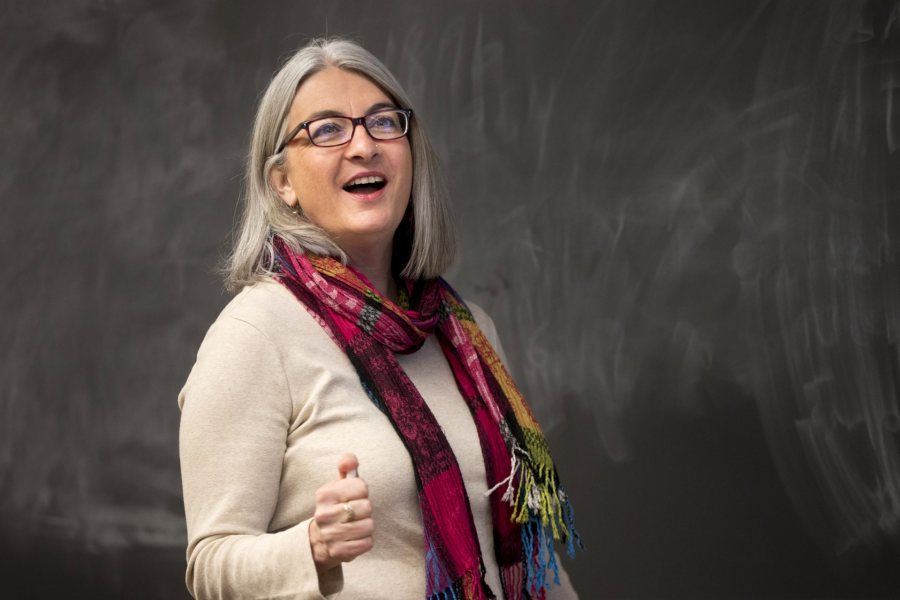
Anita Charles teaches a course on basic concepts in special education in March 2018. (Phyllis Graber Jensen/Bates College)
Instead of expecting students to adhere to “white, middle-class, able-bodied, English-speaking, cisgender” norms, Charles encouraged teachers to learn about the cultural backgrounds of each student and advocated for a variety of practices, including culturally responsive and trauma-informed teaching and restorative justice.
Overall, Charles argued that teachers should not think of students who differ from a particular norm as less-than. “A strength-based lens allows us to see every child as valuable to the classroom as a whole,” she wrote.
Read the story:
- “Relationship-based practices for today’s students,” Heinemann Publishing, Oct. 11, 2019
Hannah Morris ’96
Art review: “Waiting to Happen: Hannah Morris” — Seven Days
Vermont alt-weekly Seven Days editor Pamela Polston reviewed “Waiting to Happen,” a solo exhibition of gouache-and-collage works by Hannah Morris ’96.
Morris’ works evoke “the magical realism we remember from children’s books,” Polston wrote, as well as elements of the far-flung locales where Morris has lived. She “asks viewers to accept that the ground we walk on can be salmon-pink; that figures can appear in both color and black-and-white in the same scene; that dimensionality doesn’t have to play by the rules,” Polston added.
Read the review:
- “Art review: ‘Waiting to Happen: Hannah Morris,’ Northern Daughters,” Seven Days, Sept. 25, 2019
Justine Wiesinger
New climate change comedy uses laughs to tackle tough questions — WUNC
Frank Stasio of North Carolina public radio station WUNC spoke with Assistant Professor of Japanese Justine Wiesinger about her new play, Waters Rise, which premiered this month at the Women’s Theater Festival in Durham, N.C.
The play is set in a world where there is massive flooding, with government inaction and misinformation and little insight into the future. It’s a comedy.
Wiesinger, who spent time in Tokyo just after the 2011 earthquake, tsunami, and nuclear accident in Fukushima, Japan, focuses her research on the theater and film that emerged from the disasters.
The play explores individual people’s complicity in climate change. “It’s painful to ask ourselves in different ways how we are contributing, what we are doing to change the situation, and if our strategies are at all effective,” Wiesinger told Stasio.
Listen to the story:
- “New climate change comedy uses laughs to tackle tough questions,” WUNC, Oct. 9, 2019
Kelli Armstrong ’86
Dr. Kelli Armstrong inaugurated as president of Salve Regina University — Rhode Island Catholic
Brian Fraga of Rhode Island Catholic covered the inauguration in September of Salve Regina University’s new president, Kelli Armstrong ’86, who brings to the university a long career in higher education, including as vice president for planning and assessment at Boston College.
Armstrong has been serving as president since July, but the university officially marked her inauguration with a Mass, a ceremony, a barbecue, and an inaugural ball.
“I’m humbled and honored to serve at such an exceptional institution,” Armstrong said. “What sets Salve apart from other universities is that in the great tradition of a mercy education, we help our students become their best selves and make a difference in the world.”
Read the story:
- “Dr. Kelli Armstrong inaugurated as president of Salve Regina University” — Rhode Island Catholic, Sept. 26, 2019
